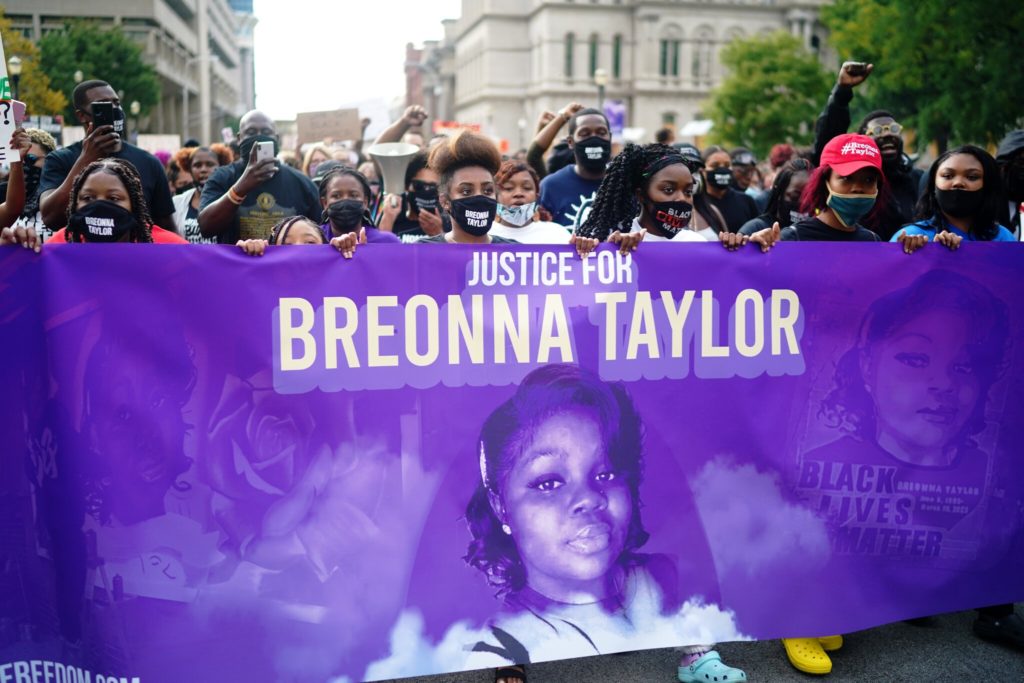Two More Officers from Breonna Taylor Raid Fired
The detective who shot her and another who prepared the warrant have been ousted nine months later.

Nicholas Bogel-Burroughs for the New York Times (“Louisville Officer Who Shot Breonna Taylor Will Be Fired“):
The Louisville police officer who fired the shot that killed Breonna Taylor, a Black emergency room technician whose death set off a wave of protests on American streets, was told on Tuesday that the department was moving to oust him from the force, as was a second officer who obtained a judge’s approval for the poorly planned nighttime raid on her home.
The move is the most significant acknowledgment by the department that its officers had committed serious violations when they burst through Ms. Taylor’s door late one night in March, encountered gunfire, and then fired a volley of shots at her and her boyfriend. The terminations mark an effort by the city’s interim police chief, Yvette Gentry, to achieve the reckoning she promised when she came out of retirement to lead the troubled department into the beginning of the new year.
Lawyers for Detective Myles Cosgrove, one of the officers who shot Ms. Taylor, and Detective Joshua Jaynes, who prepared the search warrant for the raid, said each had received notices of termination. Both have been on administrative reassignment as the investigations have been underway.
Until now, the only officer held accountable in the case had been Brett Hankison, a detective, who was fired in June for violating the department’s deadly force policy by shooting off 10 rounds from outside the apartment through two of Ms. Taylor’s windows. He was indicted by a grand jury in September on three counts of wanton endangerment because shots he fired entered a neighboring apartment.
Cosgrove and Hankinson ertainly deserve to have been fired. That it took this long—and came after a retired police chief was brought in to restore public confidence—muddies the signal, however. On the one hand, it should have happened months ago, given the sheer needlessness of a middle-of-the-night raid to look for drugs. On the other, it looks like a political move, a sop to satisfy the protestors, rather than a real acknowledgment of wrongdoing.
The Haynes firing, though, is more interesting:
Detective Jaynes, who did not take part in the raid, had been assigned to a unit formed shortly before the operation that was designed to focus on micro-locations plagued by violent crime. After analyzing crime statistics, the unit focused its attention on a street of derelict and abandoned houses in West Louisville, where Ms. Taylor’s former boyfriend was suspected of operating a series of trap houses.
At issue in the accusations against Detective Jaynes is the search warrant affidavit for Ms. Taylor’s apartment that asserted that the police had spoken with the U.S. Postal Service and verified that parcels intended for Ms. Taylor’s ex-boyfriend had been delivered to her apartment. Chief Gentry said Detective Jaynes had been misleading because he had actually gotten the information not from the Postal Service, but from another police officer.
“Having an independent, third party verify information is powerful and compelling information,” Chief Gentry wrote in the letter to Detective Jaynes, a copy of which was reviewed by The Times. “The inclusion of this in the affidavit as a direct verification was deceptive.”
Thomas Clay, the detective’s lawyer, said his client had never lied in getting the search warrant to search Ms. Taylor’s apartment.
“They have basically tried to throw him under the bus and he’s not going to fit under the bus because he did nothing wrong,” Mr. Clay said. Detective Jaynes will have an opportunity to respond to the chief’s claims at a department hearing on Thursday, according to the letter.
My strong suspicion is that Haynes was indeed deceptive in the application for the search warrant. My even stronger suspicion, however, is that this is common practice in the Louisville Police Department and, indeed, all police departments. I’m not sure the Department wants that discovery that would almost certainly accompany a wrongful termination suit.






Probably true but the country as a whole would benefit.
Couple points to keep in mind.
First, if I’m reading the current Louisville Metro Police and Union Contract correctly, there is an arbitration clause. So receipt of notices of termination is just the first stage in a longer process. Its relatively common for fired police officers to be reinstated via arbitration.
Beyond that, unless their state issued police certifications are taken away, there’s a good chance they can just head down the road to another police department (or to another State with reciprocity agreements and be back on the force. And have no doubt, there are definitely other departments in the US who see these people as the victims in all of this.
Beyond that, James you are probably right about the discovery thing. And, while @SKI is correct that we would all be better for that discovery to happen, my bet is that the City will settle to avoid all of that (if it comes to it).
In related news, the Golden State Killer has had his library card revoked.
@mattbernius:
I skimmed this thing at light speed, but the arbitration clause appears to be applicable to grievances. Disciplinary actions are explicitly excluded from that and, under the terms of Kentucky state law, are subject to appeal to the Louisville Metro Police Merit Board, and from there proceed up through further appeals in the KY courts.
Just FYI, that board is supposed to have seven members (2 currently serving police officers and five civilians). Those 5 civilians are:
a retired African-American former Louisville police officer
a retired “other ethnicity” former civil servant (City of Louisville) in her late 60s
a retired Caucasian former civil servant (DOD) in her early 70s
a retired African-American former Jefferson County Deputy Sheriff in his 60s
a retired (seeing a theme here?) Caucasian US Army LTCOL military police officer in his early 70s
I think we can safely say that they’re unlikely, as a board, to sustain a termination if any of these officers appeal to them.
I’m probably overreacting and unjustly at that, but I find myself a little more than slightly perturbed that the judge who granted the warrant will probably walk away from this little festival with clean hands and a reputation for being a sober jurist who’s tough on crime.
Took awhile, hopefully more to come. There was a concerted effort, after the killing to soil the reputations of the victims. Anyone involved in this should be held to account as well. Right off the top of my head, anyone from the DAs office that offered a deal to JaMarcus Glover,
The ex boyfriend, to implicate the deceased Miss Taylor, obviously to imply that she was not worthy of the public’s outrage.
@HarvardLaw92:
Thanks for the checking… and yeah, that’s (sadly) a pretty standard mix of “civilians” on these boards. The rational you usually here is that you need to have people with past Law Enforcement experience on these boards because regular civilians don’t know enough about how hard the job is to be a fair judge.
You mileage with that may vary.
@mattbernius:
Agreed. The problem we usually see with the concept of review boards is they they’re normally staffed by people who volunteer for the positions (which tends to produce the elderly who have the free time to participate) and the tendency to skew towards perceived subject matter experts (which results in boards loaded with former cops). KY is better than some, in that they leave the final determination up to the courts, but in the end it’s a fight to get rid of these guys. It always has been.